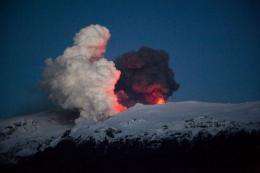Tests on Iceland volcano to aid forecasting: scientist

Tests carried out during the recent eruption of an Icelandic volcano will allow experts to better forecast the effect on air travel caused by volcanic ash clouds, a scientist said Wednesday.
But there must still be better cooperation with civil authorities to ensure that disruption to air travel is kept to a minimum, German expert Ulrich Schumann said at a conference for geoscientists in Vienna.
"We are better prepared now than we were two weeks ago," Schumann, the director of the German Aerospace Centre, told journalists at the European Geoscience Union congress. "We now have an alert system."
A cloud of ash from Iceland's Eyjafjoell volcano provoked widespread air traffic chaos last month, and on Wednesday a newly potent plume of debris again grounded flights in Britain and Ireland.
Schumann presented results from a test flight made at the weekend by German researchers, when they passed through the cloud around 500 kilometres (310 miles) away from Eyjafjoell to measure the amount of ash.
"The volcano produces 3,000 kilogrammes (6,610 pounds) of ash per second and these remain suspended for seven hours after the eruption, according to low estimates," Schumann said, adding that there had been no measurements possible in the densest part of the cloud.
Researchers were then able to observe how the particles dispersed, he said.
"This data will allow us to calibrate forecast models in order to determine exactly the quantity of ash suspended in the air," Schumann said.
But he said that the forecasts had to be used alongside observations from various civilian agencies.
"Only the use of computer models, together with terrestrial, aerial and satellite observations can give an accurate picture of the situation," Schumann said.
(c) 2010 AFP




















